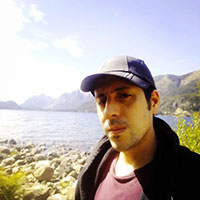 Daniel A. Morón-Alfonso. Universidad de Buenos Aires, Facultad de Ciencias Exactas y Naturales, Departamento de Ciencias Geológicas, Área de Paleontología, Ciudad Universitaria, Pab. 2, C1428EGA, Buenos Aires, Argentina. CONICET-Universidad de Buenos Aires, Instituto de Estudios Andinos “Don Pablo Groeber” (IDEAN), Buenos Aires, Argentina. paleokarzis@gmail.com
Daniel A. Morón-Alfonso. Universidad de Buenos Aires, Facultad de Ciencias Exactas y Naturales, Departamento de Ciencias Geológicas, Área de Paleontología, Ciudad Universitaria, Pab. 2, C1428EGA, Buenos Aires, Argentina. CONICET-Universidad de Buenos Aires, Instituto de Estudios Andinos “Don Pablo Groeber” (IDEAN), Buenos Aires, Argentina. paleokarzis@gmail.com
Daniel Andrés Morón-Alfonso is a paleontologist specialist on invertebrates and marine fauna, principally cephalopods and other mollusks. In 2018 he obtained a M.Sc. degree in Paleontology from the Facultad de Ciencias Exactas y Naturales, Universidad de Buenos Aires (Argentina). His main interests include the macroevolutionary patterns of fossil fauna, palaeobiology, palaeoecology, virtual palaeontology, morphometric and geomorphometric techniques, and dynamical systems applied to biological problems. Currently, he is a Ph.D. student of Geologic Sciences at the Universidad de Buenos Aires. His research is heeded on the development and application of virtual techniques to study the palaeobiology of marine fossils.
![]()
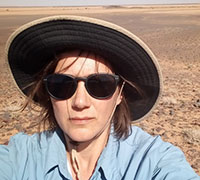 Marcela Cichowolski. Universidad de Buenos Aires, Facultad de Ciencias Exactas y Naturales, Departamento de Ciencias Geológicas, Área de Paleontología, Ciudad Universitaria, Pab. 2, C1428EGA, Buenos Aires, Argentina. CONICET-Universidad de Buenos Aires, Instituto de Estudios Andinos “Don Pablo Groeber” (IDEAN), Buenos Aires, Argentina. mcicho@gl.fcen.uba.ar
Marcela Cichowolski. Universidad de Buenos Aires, Facultad de Ciencias Exactas y Naturales, Departamento de Ciencias Geológicas, Área de Paleontología, Ciudad Universitaria, Pab. 2, C1428EGA, Buenos Aires, Argentina. CONICET-Universidad de Buenos Aires, Instituto de Estudios Andinos “Don Pablo Groeber” (IDEAN), Buenos Aires, Argentina. mcicho@gl.fcen.uba.ar
Dr. Marcela Cichowolski is a paleontologist focusing on cephalopods. She teaches Invertebrate Paleontology at the University of Buenos Aires, in Argentina, where she also develops her studies on cephalopods. She worked with Cretaceous nautilids from Argentina and Antarctica during her PhD, and after that she started to study Palaeozoic cephalopods from southern South America.
![]()
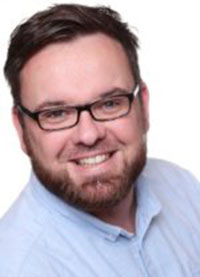 René Hoffmann. Institute of Geology, Mineralogy, & Geophysics, Ruhr-Universität Bochum, 44801 Bochum, Germany. Rene.Hoffmann@rub.de
René Hoffmann. Institute of Geology, Mineralogy, & Geophysics, Ruhr-Universität Bochum, 44801 Bochum, Germany. Rene.Hoffmann@rub.de
René Hoffmann received a diploma and a PhD from the Freie Universität Berlin in 2005 and in 2009 respectively. His research interests have primarily focused on ammonites, an extinct group of cephalopods. Over the years he extended his research to living cephalopods. Hoffmann is mainly interested in the palaeobiology and palaeoecology of the ammonites. He has conducted field research in Japan, Russia, and Morocco. Hoffmann applied first non-invasive imaging methods such as computed-tomography to reconstruct the complex internal architecture of ammonite shells. In recent years more geochemical proxy data were applied to decipher the palaeoecology and palaeobiology of this extinct group that ruled the world oceans for hundreds of millions of years. This research started at the Ruhr-Universität Bochum where he is the head of the microanalytical laboratories.
![]()
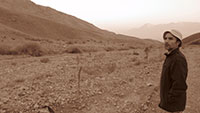 Dieter Korn. Museum für Naturkunde, Leibniz-Institut für Evolutions-und Biodiversitätsforschung, Invalidenstraße 43, 10115 Berlin, Germany. dieter.korn@mfn.berlin
Dieter Korn. Museum für Naturkunde, Leibniz-Institut für Evolutions-und Biodiversitätsforschung, Invalidenstraße 43, 10115 Berlin, Germany. dieter.korn@mfn.berlin
Dieter Korn started as a private collector and researcher on Devonian and Carboniferous ammonoids and received his diploma and doctorate from the University of Tübingen in 1994 and 1996 respectively. In the early years, taxonomy and stratigraphy of ammonoids were the focus of interest, later other methods such as morphometrics and cladistics were added. While working as a palaeontological curator at the Museum für Naturkunde, Dieter Korn led several research projects, including morphometric analyses of ammonoid conchs and the evolution of ammonoids and nautiloids at the Permian-Triassic boundary; these studies also examined temperature changes calculated from isotopic changes in conodonts and ostracods. Other study projects have been concerned with the analysis of Carboniferous calicturbidite sequences, the Devonian and Carboniferous stratigraphy of North Africa, the western United States, Ireland and Serbia, small shelly fossils in Iran, Ordovician nautiloids and carbon isotopy at the Devonian-Carboniferous boundary. Dieter Korn is co-editor of the two-volume book Ammonoid Paleobiology (Klug et al., 2015).
![]()
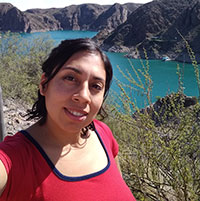 Verónica V. Vennari. Instituto de Evolución, Ecología Histórica y Ambiente (IDEVEA), Universidad Tecnológica Nacional, Facultad Regional San Rafael (UTN-FRSR). Gral. J.J. Urquiza 314, M5602GCH, San Rafael, Mendoza, Argentina. vvennari@mendoza-conicet.gob.ar
Verónica V. Vennari. Instituto de Evolución, Ecología Histórica y Ambiente (IDEVEA), Universidad Tecnológica Nacional, Facultad Regional San Rafael (UTN-FRSR). Gral. J.J. Urquiza 314, M5602GCH, San Rafael, Mendoza, Argentina. vvennari@mendoza-conicet.gob.ar
Verónica Vennari has a degree in Paleontology and a PhD in Geological Sciences, both from the Buenos Aires University, Argentina. Currently, she is an Adjunct Professor at the Cuyo University, and a CONICET researcher at the Instituto de Evolución, Ecología Histórica y Ambiente (IDEVEA-UTN), in San Rafael, Mendoza, Argentina where she studies Upper Jurassic to Lower Cretaceous ammonoid faunas from the Neuquén Basin and other gondwanian basins. Her contributions mostly focus in biostratigraphy and systematics of ammonoids, and cooperates with researchers of other Mesozoic fossil groups.
![]()
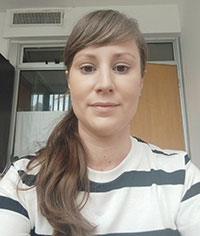 Ninon Allaire. Consejo Nacional de Investigaciones Científicas y Técnicas (CONICET), Centro de Investigaciones en Ciencias de la Tierra (CICTERRA), Córdoba, Argentina. ninon.allaire@gmail.com
Ninon Allaire. Consejo Nacional de Investigaciones Científicas y Técnicas (CONICET), Centro de Investigaciones en Ciencias de la Tierra (CICTERRA), Córdoba, Argentina. ninon.allaire@gmail.com
Ninon Allaire received a bachelor in Environmental and Earth Sciences from the University of Saint-Etienne (France), a Master in Palaeontology, Sedimentology and Palaeoenvironments from the Ecole Normale Supérieure de Lyon and the University Claude Bernard Lyon 1 (France), and a doctorate (PhD) in Palaeontology from the University of Lille (France). She was a postdoctoral fellow at the IGFL (France) and at the GeoZentrum Nordbayern (Germany). Since 2022, she is working at the CICTERRA (Argentina) as a postdoctoral researcher. Her research mainly focuses on the evolution of the early ammonoids (Devonian). She studies the fluctuations of their taxonomic richness and morphological disparity through time.

